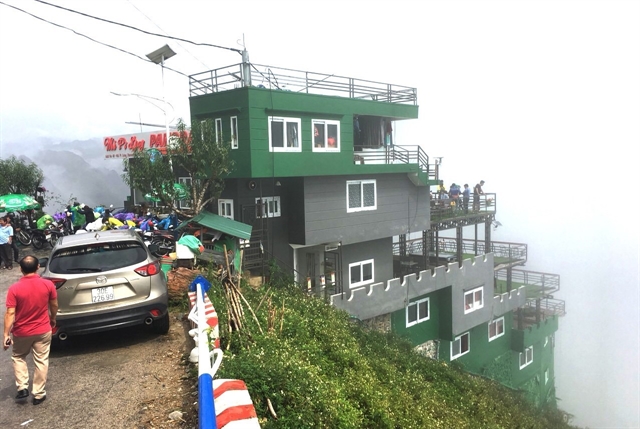 Society
Society

Bùi Văn Dương, deputy director general of the Department of Construction, talks to Tuổi Trẻ (Youth) newspaper about serious encroachments made by some construction projects at historic sites and parks in the northern mountainous province of Hà Giang

|
Bùi Văn Dương, deputy director general of the Department of Construction, talks to Tuổi Trẻ (Youth) newspaper about serious encroachments made by some construction projects at historic sites and parks in the northern mountainous province of Hà Giang
What can you tell us about illegal construction projects at national heritage sites and parks in Hà Giang?
There are different reasons for these illegal construction activities in Hà Giang Province. Recently, Prime Minister Nguyễn Xuân Phúc gave the green light for a master plan on tourism development projects on the Đồng Văn Karst Plateau - a national tourism site. The PM has also given the green light for a construction plan at the Đồng Văn Geological Park - a member of the Global Network of National Geoparks.
However, due to budget and resource shortages, detailed plans for the construction and management of the park have not yet been made available to the public.
Furthermore, poor law enforcement has allowed illegal constructions in the surrounding areas of Đồng Văn.
Which local agency is in charge of the management of planning and construction in mountainous provinces?
Under Vietnamese law, administrations at all levels, ranging from commune to district to province, are charged with the management of planning and construction activities in their localities. If local authorities can’t perform their duties well, how can Government agencies oversee illegal construction activities in tourism hotspots like Mã Pì Lèng and Đồng Văn.
Generally speaking, our laws on planning and construction are complete. Under the law, it is the duty of all provincial and district People’s Committees to carry out their missions in localities under their management. Provincial construction departments have to submit monthly, quarterly and annual reports to the Ministry of Construction. The Ministry then compiles a national report to submit to the Prime Minister. However, in special circumstances which are beyond the capacity of provincial authorities, they will seek help from the ministry. More recently, serious cases of breaches of the Construction Law have been reported in many provinces, but provincial authorities have not sought support from the ministry.
Does the Ministry of Construction have any plans to set rules for construction activities in Hà Giang Province?
Since 1999, Việt Nam has been developing a complete set of legal documents on construction planning and investment activities. However, in recent years, the real estate market has been developing rapidly, particularly in the tourism real estate sector. This has presented challenges to the authorities at both central and local levels. This is one of the reasons why resorts have been built without official permits from authorities all over the country.
In the draft revised Law on Construction which will soon be discussed by the National Assembly, the Ministry of Construction has come up with specific regulations on the rights and responsibilities of concerned agencies in the construction field. The draft law also covers rules and regulations on construction management after licences have been granted.
Do you think that the National Assembly should enact another law focusing specially on construction activities in mountainous regions, particularly regions with heritage sites and the potential to develop tourist resorts?
Our current Construction Law already covers all types of management, including regions which are home to relic sites or have potential for tourism development. The draft revised Construction Law, which is already on the table for the National Assembly, includes more specific articles on the rights and responsibilities of concerned agencies on keeping law and order in the construction field.
Regarding mountainous regions with historical relic sites and big potential for tourism development, owners of all construction projects have to strictly follow the Construction Law and other related laws, including the Land Law, the Law on Environmental Protection, and the Law on Tourism, among others. — VNS




